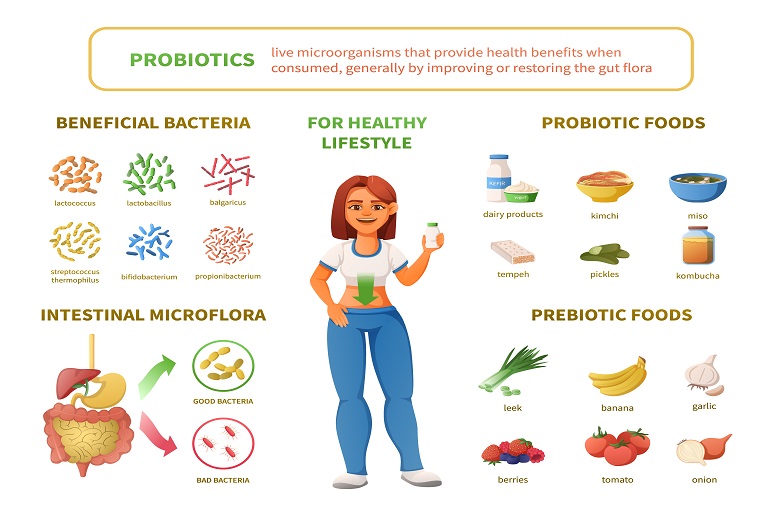
Prebiotics and Probiotics: The Good and the Bad
Prebiotics and probiotics are both important for gut health, but they can be confusing to understand. Here's a quick overview of what each is and how they work together:
Prebiotics
Prebiotics are a type of fiber that are not digested by the body. Instead, they are fermented by beneficial bacteria in the gut, which helps to keep the gut healthy. Prebiotics are found in many foods, including fruits, vegetables, and whole grains.
Probiotics
Probiotics are live bacteria that are similar to the beneficial bacteria that are found naturally in the gut. When taken in supplement form, probiotics can help to restore the balance of good and bad bacteria in the gut, which can help to improve overall health. Probiotics are found in some foods, such as yogurt and kefir, but they are also available in supplement form.
How Prebiotics and Probiotics Work Together
Prebiotics and probiotics work together to keep the gut healthy. Prebiotics provide food for the beneficial bacteria in the gut, while probiotics help to restore the balance of good and bad bacteria. This can help to improve overall health, including digestion, immunity, and mood.
The Benefits of Prebiotics and Probiotics
Prebiotics and probiotics have many benefits, including Improved digestion: Prebiotics can help to keep the gut healthy and regular. Probiotics can help to restore the balance of good and bad bacteria in the gut, which can help to improve digestion. Boosted immunity: Prebiotics and probiotics can help to boost the immune system by helping to keep the gut healthy. A healthy gut is important for a strong immune system. Improved mood: Prebiotics and probiotics can help to improve mood by helping to keep the gut healthy. A healthy gut is important for mental health. Reduced inflammation: Prebiotics and probiotics can help to reduce inflammation by helping to keep the gut healthy. Inflammation is a major cause of many chronic diseases.
How to Get Prebiotics and Probiotics
There are many ways to get prebiotics and probiotics in your diet. Here are a few tips: Eat plenty of fruits, vegetables, and whole grains. These foods are high in prebiotics. Choose yogurt and kefir as your go-to dairy products. These foods are high in probiotics. Take a probiotic supplement. Probiotic supplements are available to buy on our website. Talk to Your Doctor before Taking Prebiotics or Probiotics supplements.
If you are considering taking prebiotics or probiotics, it is important to talk to your doctor first. They can help you to choose the right supplements for you and make sure that they are safe for you to take.
